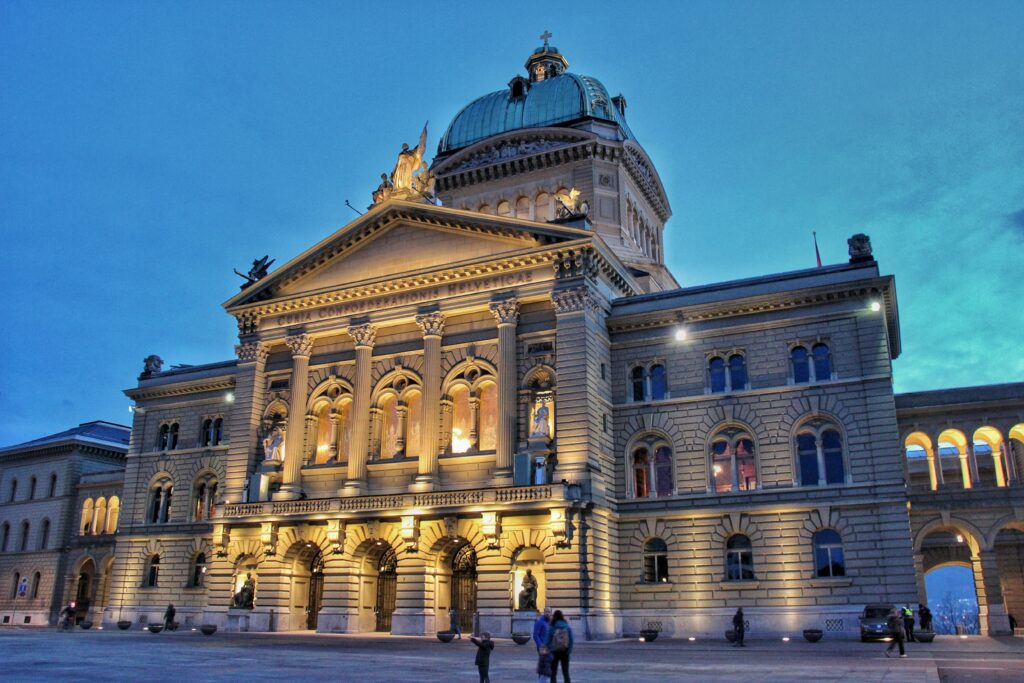Tue, Feb 21st 2023

Swiss Parliament, also known as the Bundesplatz, is where the proposed budget balancing plan will be approved.
The country of Switzerland recorded a nearly CHF 2 billion deficit for 2022 – the biggest since 2005, according to a federal government report (French) recently released.
Switzerland spent CHF 4.3 billion more than it received in 2022. Excluding unexpected expenses related to the Covid-19 pandemic, Switzerland was still left with the biggest deficit the country has seen in nearly 20 years.
Moreover, the federal government put in place a special “debt brake” after the 2005 shortfall to prevent such a large deficit from occurring again. The debt brake, established in 2006, requires lawmakers to generate and reserve enough funds in the good times to cover their losses during the bad.
The debt brake worked effectively from 2006 until 2020, when the Covid-19 pandemic hit. Spending rose as Switzerland scrambled to equip public and medical facilities with what they believed was needed. Millions of masks were ordered, as well as vaccines. In recent months it has come to light that Switzerland may be forced to destroy as much as CHF 130 million worth of expiring face masks, as well as about 20 million Covid-19 vaccine doses. (Read more: You probably don’t need the vaccine, Swiss officials say)
Moreover, Switzerland closed all businesses aside from the most essential ones for months in the name of Covid; and, then wrote checks to keep them afloat. Unfortunately, as much as CHF 5 billion of the financial aid handed out has been under investigation for possible fraud, according to the Swiss Federal Audit Office.
It is unsurprising that in 2021 Switzerland faced a shortfall of CHF 12.2 billion – twice as much as what the Swiss government had budgeted for 2021. Whatever had been set aside in better years was quickly exhausted.

The new plan calls for cutting a planned expansion of military spending. The expansion was in response to the Russo-Ukrainian conflict.
Two weeks ago, the Federal Council presented a new plan to help balance the budget for 2024. It calls for cutting the planned military spending by CHF300 million in 2024, CHF500 million in 2025, and up to CHF800 million in 2026. The original plan was aimed at increasing the Swiss military budget gradually until it reaches at least 1% of Swiss gross domestic product.
Considering Russia’s invasion of Ukraine, cutting a planned military expansion has been a controversial idea from the start.
The government’s decision followed the “path of least resistance and did not in any way take into account parliament’s decision,” Werner Salzmann (Swiss People’s Party) told SRF public radio. Salzmann heads up the Senate’s security policy commission. He says the cuts will delay much-needed modernization for the Swiss Army and that the Federal Council should consider making cuts elsewhere.
The proposed plan also calls for cuts to the Horizon Europe research program, support of the Swiss Rail system, support for Ukrainian refugees, as well as reducing funding for state pensions and unemployment benefits. The plan would also reduce the share of federal taxes for cantons, putting the pressure on cantons to come up with their own budget balancing ideas.
The proposal will continue to be discussed in the weeks to come, before it is up for approval by Parliament.
This article may be freely shared and re-printed, provided that it prominently links back to the original article.
